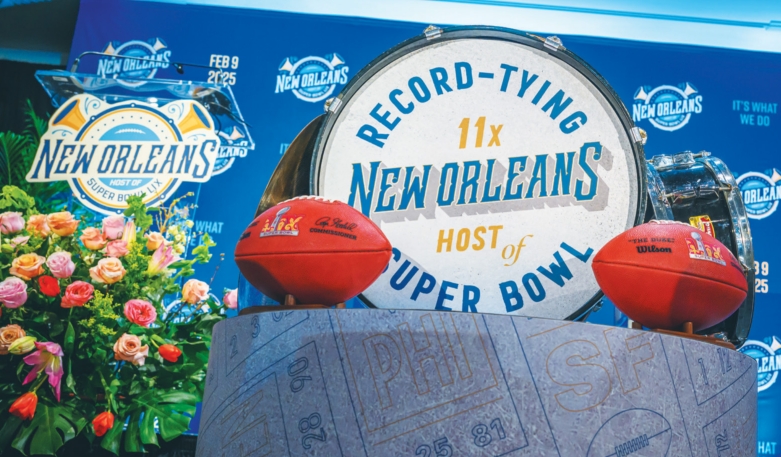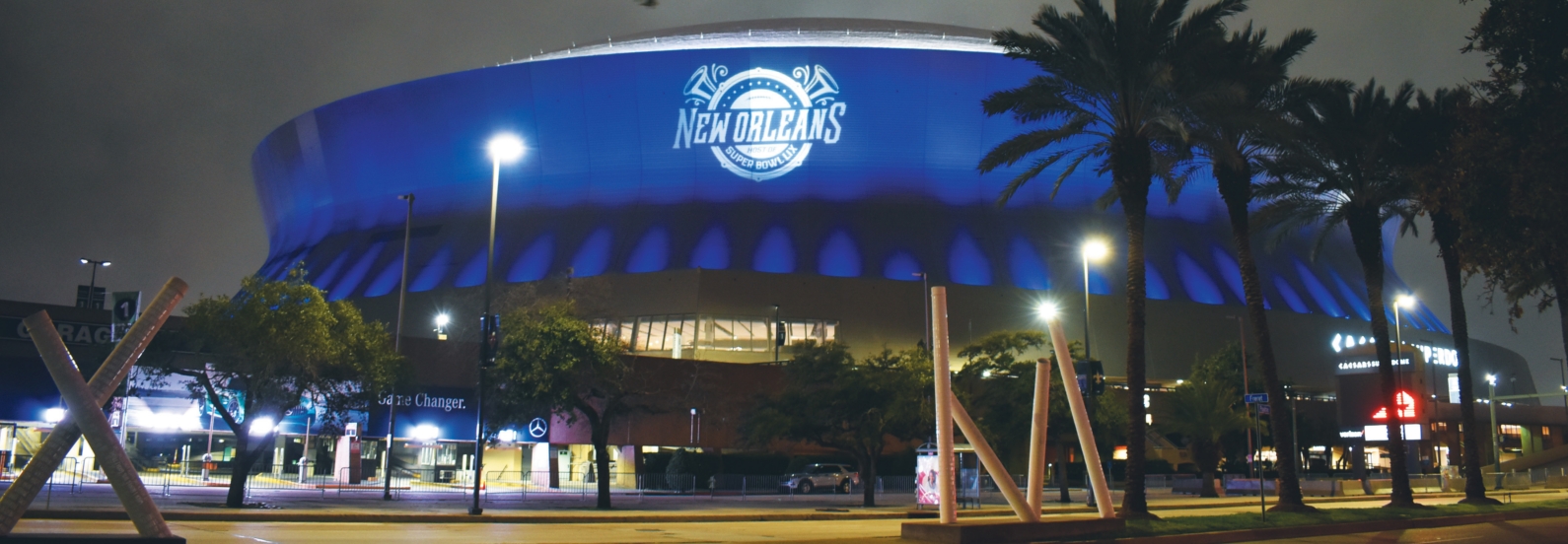
New Orleans will serve as the host city of the Super Bowl. Shreveport native tasked with attracting visitors to state
You think YOU’VE got a lot of responsibility at work?
Meet Jay Cicero.
The Shreveport native, who graduated from what was then Jesuit High School and Louisiana Tech, is the president/CEO of the Greater New Orleans Sports Foundation (GNOSF). What does that mean?
Try being responsible for pretty much anything and everything to do with the city hosting Super Bowl LIX (59), which will be played next February. The 62-year-old oversees a staff of 25, 32 committee chairs and cochairs, and more than 5,000 volunteers.
“There’s nothing like a Super Bowl, I gotta tell you,” Cicero said when he was recently in town. “It brings everybody together for one purpose. We like to say, ‘There’s all these other activities, and by the way, there’s going to be a game, and it’s going to be magnificent’. But it’s everything else that happens in the two weeks — and several months — leading up to the game that’s important to us, and what we’ve been working on since we won the bid.”
Cicero began his career with the Shreveport Captains, which at the time was the city’s Double-A baseball affiliate of the San Francisco Giants. Cicero worked four years under owner Taylor Moore and learned lessons he still puts into play.
“(Taylor) really set an atmosphere and a mantra that was ‘Family First.’ And you don’t have to do something terrible to make money. You could do something family-oriented, and you could have family pricing. Hospitality was number one.
Every day we had a game, when everybody would come to the stadium, we were all standing out front meeting and greeting people. That kind of service creates one-on-one communication, relationships not only with businesspeople but folks involved with the community, and the mindset that business is business, but family comes first. Taylor instilled that in me, and I try to instill that in my staff today.”
Although Jay has long been removed from Shreveport, he still has fond memories, especially of his former office, Fair Grounds Field. Jay has seen the half-demolished eyesore.
“It’s heartbreaking. It really is. I try to remember what it looked like back then. Going up to the press box area and the sky box area we had, and the beer garden down the third base line, and what the locker rooms were like. It reminds me a lot of the people we came in contact with on a daily basis. It’s kind of sad.”
In addition to his time with the Captains, Cicero also credits his success — he’s been with the GNOSF for 34 of the organization’s 36 years — to his high school days. Days in the classroom and days being around his father, who was the school’s long-time baseball coach and a classroom teacher.
“The camaraderie we had. The friendships we had. The relationships we had, not just with the folks I graduated with in 1980, but with all the other years. It was a very special childhood, but it’s just the way it was. You didn’t think about it being special back then. When you talk with people who didn’t go through that, who didn’t experience that, they go, ‘Wow! That must have been something else!’ You look back, and it was. It was very special to be around those people and those coaches.”
Cicero has presided over bids for and production of major events like Super Bowls, Men’s Final Fours, and NBA AllStar games. But he almost went down another road — until the earth shook under his feet.
“I had wanted to go into Major League Baseball and was working with the minor league department of the Giants to move to San Francisco and be a part of their group. In 1989, we were out there when the earthquake hit, and I said, ‘I can’t move to California.’ It kind of changed (my plans), and less than a year later, I moved to New Orleans and started working in sports.”
This season’s Super Bowl is expected to bring 125,000 visitors to New Orleans, including an estimated 6,000 credentialed media members who will shine a spotlight on the Crescent City. But before New Orleans could host the event, it had to win the privilege.
“It used to be that when we bid, we just said, ‘Come to New Orleans! We’ve got 20,000 hotel rooms within walking distance of the (Caesars Superdome), the French Quarter, the Convention Center and the (Mississippi) River.’ That would win it for you. Now, (the bid) has to be financially competitive with other cities. So, how do we do that? It’s not necessarily a number, but delivering these items to the NFL or the NCAA at an expense we can afford.”
And that means raising money, which is a large part of Jay’s job.
“These Tier One events have a certain set of competitors, and every one of them has more businesses located in their state. We have four-and-a-half million people in our state. They have metropolitan areas that are bigger than our entire state. You have to be creative, and you have to be resourceful. You’re delivering what they’re asking for in the bid at a lesser cost than other cities. It’s a lot less expensive to do business in Louisiana, which is great. Transportation costs are certainly lower in New Orleans, because everything is within walking distance. But you have to raise a lot of money – public and private money. That’s what keeps me up at night.”
Just a few more months of sleep deprivation.

This season’s Super Bowl is expected to attract 125,000 visitors to New Orleans